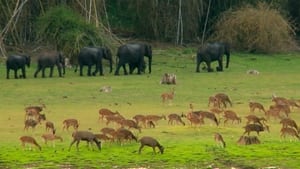
Imagine a lost world – head hunting tribes, tiger-infested forests, unclimbed mountains, pristine rivers. Known as the Seven Sisters of India, there are seven relatively unexplored and isolated Indian states. What mysteries lie within this secretive land and why have they remained untouched for so long? North-east India is an anthropological paradise; there is no other place on Earth with so many different ethnic groups. The forest slopes are filled with mysterious tribes whose lives are dictated by the ebb and flow of the rain and the seasonal fruits of the forest. In these largely unexplored and isolated areas people scarcely known to the Western world continue a way of life steeped in ancient rituals.

Stretching for a thousand miles along India’s west coast, the Western Ghats are a spine of mountains that lay claim to being one of the most bio-diverse places in the world. Mountains rear their heads into the path of monsoon clouds, intercepting rains and making the western slopes some of the wettest places in India. Tropical rain forests thrives, and explode with life. The Western Ghats hold the key to life across southern India. Rainwater harvested by the mountains washes down to the coast, feeding Kerala’s backwaters; huge rivers flow east across India’s dry interior, a lifeline to animals and people.

Outside Asia, no peak reaches above 7000 metres, but along the Himalayan range, over 100 mountains exceed this height by at least 200 metres, making it the tallest mountain range on the planet. As Earth meets the sky along this hostile terrain, powerful winds, sub-zero temperatures, and a lack of oxygen oppose virtually all forms of life, but remarkably, this immense geological feature somehow supports one of the largest and most diverse collections of creatures on the planet – including man. While the Himalayas rugged highlands offer little direct refuge to humans, in the shadow below, over a billion people in India rely on the mountains for survival.

The Ganges is the longest river in India. It flows from the glaciers of the world’s highest mountains, the Himalayas, to the largest bay in the world, the Bay of Bengal. Human pollution threatens to overwhelm the river, but somehow wild animals survive. Hindus believe that Ganges water has the power to purify, and it seems there is some scientific evidence to support this conviction: microscopic organisms actually eat bacteria that could cause disease, and uniquely high level levels of oxygen break down organic waste faster than any in other river. This self-cleaning property of Ganges water helps support some of the last remaining true wilderness in the world – the Sundarbans swamp. Here, India’s largest population of wild tigers have never learned to fear man, making them very dangerous neighbours.

Covering 200,000 square kilometers, India’s Thar Desert is one of the harshest places on the planet. Baking heat, desiccating winds and near permanent drought has earned this unforgiving land another name – “the region of death.” As we explore India’s great desert we unveil its hidden secrets, and ultimately shed light as to how the Thar has become the most crowded desert in the world.